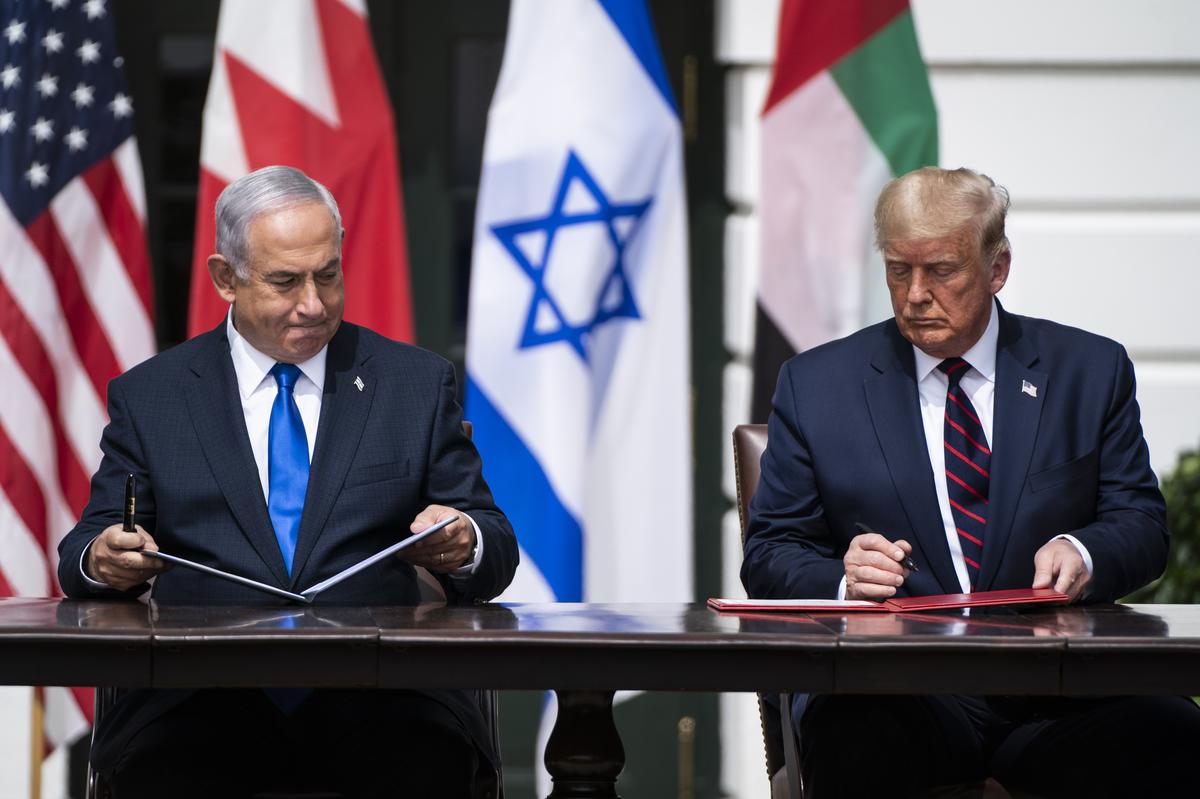
Israeli Prime Minister Benjamin Netanyahu and President Donald Trump participate in a signing ceremony for the Abraham Accords on the South Lawn of the White House on Sept. 15, 2020.
15:00 JST, November 10, 2024
With Donald Trump returning to the White House, Israel’s wars in the Middle East are likely to present an immediate challenge to a president that has touted his “America First” approach to foreign policy and has long been known for his unpredictability on the international stage.
While President Joe Biden has maintained support of Israel in its fight against Hamas, his administration has also issued warnings over the dire humanitarian conditions in Gaza and the high toll on civilians. During his campaign, Trump broadly called for an end to the Israel-Gaza war and promised that “you’re going to have peace in the Middle East,” without detailing any specific plans, while also telling Israeli Prime Minister Benjamin Netanyahu in October to “do what you have to do.”
Many in Israel were relieved to learn of Trump’s victory, though experts are split on whether a second Trump term may embolden Israel – or prompt a decrease in U.S. backing, given Trump’s generally more isolationist pitch to his supporters. Here’s what to know.
– – –
What has Trump said about Israel and Hamas on the campaign trail?
Trump has broadly called for an end to the war in Gaza but has not provided a clear plan for how he would bring that about. In his victory speech this week, he claimed incorrectly that “we had no wars” during his administration and added that while others have said he’d start wars, “I’m not going to start a war. I’m going to stop wars.”
Trump also tried to woo both Jewish and Muslim voters, sometimes offering contradictory stances on the conflict in the Middle East. For instance, Trump celebrated Israel’s military operation that killed Hamas chief Yahya Sinwar and said Netanyahu was “doing a good job.” Hours later, he met with an Arab American leader in Michigan, who had earlier agreed to endorse him, and promised he’d bring peace to the region, The Post reported.
In a May donor event, he said he supports Israel’s right to continue “its war on terror,” boasted of his White House policies toward Israel and promised to crush pro-Palestinian protests on college campuses.
Nihad Awad, national executive director of the Council on American-Islamic Relations, said that Arab and Muslim voters who felt “betrayed” by the Democratic Party’s support for Israel will be watching to see whether Trump would be able to convince Israel to support Palestinian statehood – such as through a wider negotiation with Saudi Arabia, whose crown prince is close to Trump.
In April, Trump signaled skepticism over a two-state solution, telling Time magazine: “There was a time when I thought two states could work. Now I think two states is going to be very, very tough.” (In his first term, he had proposed a sweeping plan to establish a disjointed Palestinian state largely surrounded by Israel, granting Israel vast license to incorporate Jewish settlements and control security on land it occupies.)
“We are not naive,” Awad said, citing the “Muslim ban” Trump imposed on citizens of some countries entering the United States during his last presidency. But after he participated in outreach to Arab communities during his campaign, Awad added, “we will give him a chance.”
Ahmed Morsy, a visiting fellow at the Middle East Council on Global Affairs, said in a statement that Trump and his team are “likely to push for ceasefires or temporary peace deals to showcase their peacemaking prowess” following campaign promises. Given Israel’s close relationship with Trump and his allies, however, such moves are “unlikely to improve conditions for the Palestinians or create a meaningful path toward a Palestinian state,” he said.
– – –
What is Trump’s relationship with Netanyahu?
Netanyahu was among the first to congratulate the former president on his victory this week, writing on social media that the win “offers a new beginning for America and a powerful recommitment to the great alliance between Israel and America.” Netanyahu’s far-right national security minister, Itamar Ben Gvir, meanwhile, said he was sure Trump would see “eye to eye” with Israel on laws such as the death penalty for Palestinians convicted of terrorism.
Netanyahu has shown an obvious preference for Trump during the 2024 election, and people familiar with the situation told The Washington Post that he was trying to regain Trump’s favor after angering him by congratulating Joe Biden on winning the 2020 election.
During his first term, Trump relocated the U.S. Embassy from Tel Aviv to Jerusalem and recognized the Golan Heights as part of Israel – decisions that were welcomed by many in Israel but upended decades of American foreign policy and incensed many Palestinians. His administration also determined in 2019 that Israel’s West Bank settlements did not violate international law. More than 40 years of U.S. policy had declared Israeli expansion into territories occupied since the 1967 war a major obstacle to settling the Israeli-Palestinian conflict.
“Israel is deeply grateful to President Trump, Secretary [of State Mike] Pompeo and the entire US administration for their steadfast position supporting truth and justice,” Netanyahu said in a statement at the time.
Trump’s administration also negotiated the Abraham Accords, a set of treaties normalizing relations between Israel and four Arab states – the United Arab Emirates, Bahrain, Sudan and Morocco – that broke with long-standing foreign policy consensus treating peace with the Palestinians as a condition for Israel’s more thorough integration with the Arab world. At the signing ceremony in 2020, Netanyahu praised Trump for his “decisive leadership, saying he had “unequivocally stood by Israel’s side.”
Dov Waxman, an Israel studies professor at UCLA, said Trump’s presidency could prove to be a mixed blessing for Netanyahu.
On the one hand, Trump could be open to the United States recognizing a changed map of Israel, with at least part of the West Bank formally annexed into Israel proper, Waxman said. Trump might also be amenable to supporting a continued Israeli military presence in Gaza, he said.
But Trump and his inner circle are also far more likely than previous presidents to cut military aid to Israel, which has numbered in the billions every year for decades, Waxman added. “Trump has long stated an aversion to U.S. foreign aid,” he said. “He might wonder whether the United States is getting the best end of the deal.”
"News Services" POPULAR ARTICLE
-

American Playwright Jeremy O. Harris Arrested in Japan on Alleged Drug Smuggling
-

Japan’s Nikkei Stock Average as JGB Yields, Yen Rise on Rate-Hike Bets
-

Japan’s Nikkei Stock Average Licks Wounds after Selloff Sparked by BOJ Hike Bets (UPDATE 1)
-

Japan’s Nikkei Stock Average Buoyed by Stable Yen; SoftBank’s Slide Caps Gains (UPDATE 1)
-

Japanese Bond Yields Zoom, Stocks Slide as Rate Hike Looms
JN ACCESS RANKING
-

Keidanren Chairman Yoshinobu Tsutsui Visits Kashiwazaki-Kariwa Nuclear Power Plant; Inspects New Emergency Safety System
-

Imports of Rare Earths from China Facing Delays, May Be Caused by Deterioration of Japan-China Relations
-

University of Tokyo Professor Discusses Japanese Economic Security in Interview Ahead of Forum
-

Japan Pulls out of Vietnam Nuclear Project, Complicating Hanoi’s Power Plans
-

Govt Aims to Expand NISA Program Lineup, Abolish Age Restriction



















